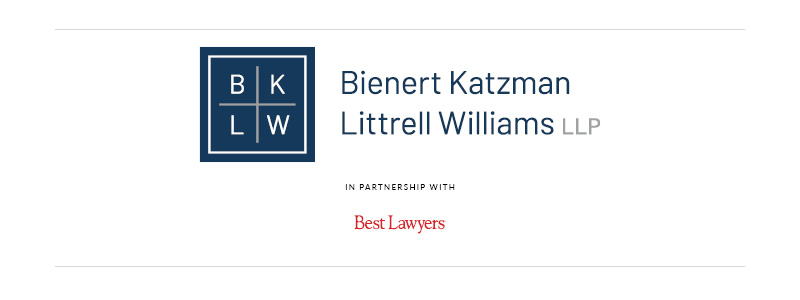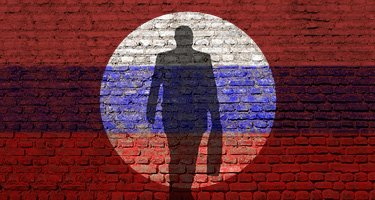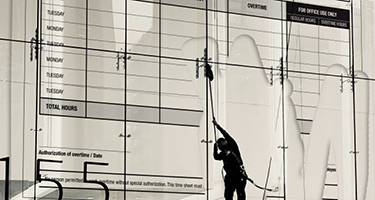The decision for someone to speak out against injustice or unlawful activity is one of the bravest—and often patriotic—actions that can be taken. This concept is at the heart of whistleblower litigation.
The lawyer privileged to represent a whistleblower from the outset must honestly assess the situation before the claim progresses too deeply. Bienert Katzman Littrell Williams LLP (BKLW) understands these scenarios and has a track record of successful and favorable outcomes in whistleblower litigation and qui tam claims.
Firm Partner Michael R. Williams leads BKLW’s commercial litigation practice with a strong focus on whistleblower litigation claims and qui tam suits under state and federal False Claim Acts (FCA). Williams and the BKLW practice made headlines in late 2017 for securing a favorable resolution on behalf of the whistleblower in United States of America et al. v. Celgene Corporation. The result was a $280 million settlement—the second-largest recovery recorded in a non-intervened case brought under the FCA.
Williams is recognized in the 2023 edition of The Best Lawyers in America® for Commercial Litigation and is widely regarded in California and the U.S. as an authority on whistleblower litigation. To better understand the complexities of whistleblower litigation and the common need for collaboration, Best Lawyers® recently sat down with Michael R. Williams.

What inspires BKLW’s enthusiasm for whistleblower litigation?
We are passionate about whistleblower litigation for several reasons. Chief among them are the opportunity to represent courageous people who come forward, being challenged to present their case to a judge or jury and the potential to help change, influence or strengthen laws that can protect others and prevent further wrongdoing.
It is one of the most complex and exciting areas of practice in the United States. Whistleblowers are on the right side of the law, and they place their faith in legal professionals with shared values who can have the system reflect their actions. It is an honor to represent these clients, and it inspires us anew with each case.
How would you characterize most of the whistleblowers you have met or represented?
Whistleblowers are thoughtful and intentional. By coming forward, they are often thrust into the spotlight and risk their careers, reputation and privacy. Some may have witnessed their employer or colleagues engage in an illegal action and felt compelled to speak out. Others might have participated in that action—wittingly or unwittingly—and realized that coming forward would be the ethical thing to do.
These people have a lot weighing on their conscience before they meet with a lawyer. The possibility of financial compensation is important—and it may contribute to the decision—but in my experience, it has not been the first or sole motivation for coming forward.
Tell us a bit about the resolution in United States of America et al. v. Celgene Corporation.
That case revolved primarily around the off-label marketing of drugs. Our client, Beverly Brown, was a former sales representative for Celgene Corporation. She filed suit against Celgene under the FCA on behalf of the U.S. government and 29 states and municipalities in 2010. She alleged that Celgene illegally promoted two of its drugs—Thalomid and Revlimid—for uses that were not approved by the Food and Drug Administration.
Furthermore, she claimed that illegal kickbacks were being paid to healthcare providers and others to help boost the sales of the two drugs. Celgene bent or sometimes blatantly broke the rules in their marketing of drugs, including through off-label marketing.
The matter was one of the most extensively litigated pharmaceutical cases ever brought under the FCA. In 2017, we helped Ms. Brown negotiate the $280 million settlement with Celgene. Ms. Brown was entitled to between 25 and 30% of the gross settlement amount under the FCA, which we had to help her fight for in the U.S. District Court in the Central District of California.
I believe that our work on the Celgene case, along with other cases in this area, made a difference by changing the way that these companies approach off-label marketing. Since our settlement, we have noted the correlation between more compliance by drug companies and fewer bombshell claims.
When was BKLW brought into the Celgene case?
The whistleblower, Ms. Brown, initially retained another lawyer who had brought in some qui tam specialists. The specialists, in turn, referred us when it looked like the government would not intervene and the case would need to be litigated.
We were brought in by a team of fantastic trial lawyers. They wanted the additional firepower in the courtroom, and that’s what we provide. This is a common scenario for BKLW—and we’re thankful for our reputation as a firm that has the technical expertise in the practice area and the best trial lawyers around who know how to try cases and secure the best results.
Why should injury attorneys refer whistleblower claims?
The reasons we just mentioned exemplify the usual reasons why referrals are helpful. And there’s a bottom-line factor as well—the defendants are typically very well-funded and have the resources to litigate and wait for their day in court. Some lawyers are not equipped, between the time and personnel needed, to see a case through to its best possible outcome. Those who are honest with themselves and refer whistleblower claims—or possibly align with another firm—can level the playing field and provide the best possible client service.
What is the traditional dynamic between your firm and a referring attorney?
There is a range, as you can imagine. There are lawyers who simply refer a case and gracefully step back until it is resolved.
But we generally partner with the referring lawyers to differing degrees. Sometimes it's because they also have expertise in the area; other times, they have a relationship with the client and want to stay involved and litigate side by side. There are different referral fee structures for each scenario, and we of course believe in reciprocity when the right opportunity arises.
It sounds like BKLW is flexible in this regard.
We work and play well with others. We don't get into ego battles that sometimes doom those sorts of counsel relationships. More often than not, we partner with the referring and we work the case together, but we’re open to different arrangements.
Michael, you emphasized how intricate and time-intensive whistleblower claims can be. What are the qualities that a potential claimant or even another lawyer should seek when filing a whistleblower claim?
They need a firm that is prepared for the long haul, adept in a courtroom, and excellent at trial before a jury. The cases require countless hours of discovery, depositions, interviews, research and pretrial motions. This can be costly and always takes years.
We embrace challenges, and whistleblower claims present the most complex, interesting litigation. Each case forces BKLW to come up with creative strategies that will be used to ultimately advocate effectively in front of judges or juries, with the goal of securing justice that reflects the bravery of the client.
Any claimant or counsel who needs to file a whistleblower or qui tam claim should speak with a lawyer with experience in this highly-focused area of law.




























